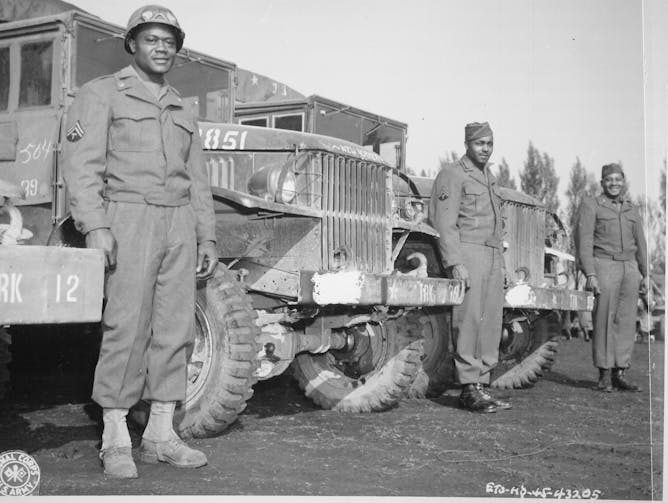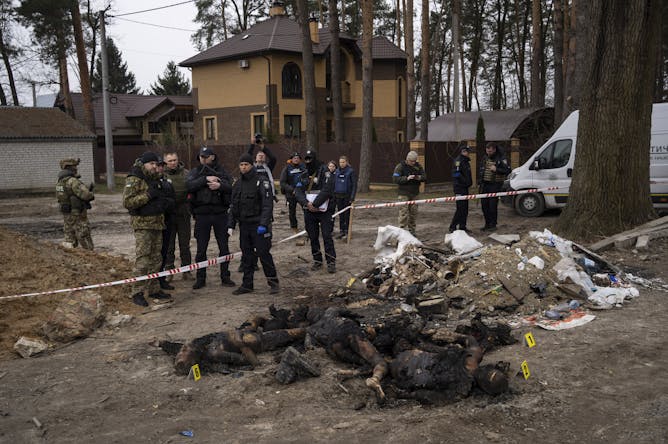|
|
|
|
One of the goals we have on the politics desk is to work as often as possible with historians. Over the past few years, as American politics has gotten more disruptive, extreme and complex, we’ve relied on those scholars to place our politics in a historical context. Turns out, some of the problems we’re experiencing now are not new, and helping readers understand how they were – or weren’t – solved in the past can cultivate a deeper appreciation for the difficulties we face.
And sometimes, it’s just really interesting to learn how a problem today was dealt with when it also happened decades ago. That’s how we ended up this week publishing “The forgotten story of Black soldiers and the Red Ball Express during World War II,” by historian Matthew Delmont. I asked Howard Manly, our race and equity editor, to describe the story – and its genesis in our Ukraine coverage.
“As the war in Ukraine continues with no end in sight, the ability to supply soldiers with food, ammunition and medical supplies is often the difference in winning or losing a battle,” writes Manly.
“Such was the case in World War II, when a little-known group of mostly Black truck drivers served in the Red Ball Express. As Delmont writes, the soldiers earned a reputation as tireless and fearless troops who fought not only Nazis but also discrimination within the segregated U.S. military.
"‘Despite the racism they encountered during training and deployment,’ Delmont writes, ‘Many saw patriotism and a willingness to fight as two characteristics by which manhood and citizenship were defined.’”
|

|
Naomi Schalit
Senior Editor, Politics + Society
|
|

Shown here in May 1945, these black soldiers were attached to the 666th Quartermaster Truck Company that was part of the Red Ball Express.
National Archives
Matthew Delmont, Dartmouth College
Comprised mostly of Black soldiers, the Red Ball Express transported supplies day and night and is given credit for providing a strategic advantage over the Nazi military.
|

The votes are there. Ketanji Brown Jackson will become the first Black woman to sit on the Supreme Court.
AP Photo/Susan Walsh
Matt Williams, The Conversation
Scholars discuss the meaning of Ketanji Brown Jackson’s elevation to the highest court in the land.
|

Rapes, torture and killings have all been reported from Bucha, Ukraine, where soldiers and investigators look at charred bodies lying on the ground.
AP Photo/Rodrigo Abd
Mia Bloom, Georgia State University
An expert on rape during war examines the emerging evidence from Ukraine that Russian soldiers raped Ukrainian women and explains the role rape plays in conflicts.
|
|
|
-
Robert Peacock, Florida International University
Russian hackers have been attacking Ukraine for years, but with help from US government agencies, businesses and universities, Ukraine’s cyber defenses have grown stronger.
-
Amy Lieberman, The Conversation
President Biden said that Vladimir Putin had committed war crimes, after news emerged of mass civilian murders in Bucha, Ukraine. Three stories from our archive explain what this means.
-
Alexander Hinton, Rutgers University - Newark
There are a few warning signs that genocide is happening. In the Russian war on Ukraine, all of those are present.
-
Joseph Wright, Penn State; Abel Escribà-Folch, Universitat Pompeu Fabra
In recent years, Western governments have, in effect, aided the rise of personalist dictators in Russia, Iraq, Libya, North Korea and Venezuela.
-
Bev-Freda Jackson, American University School of Public Affairs
President Joe Biden’s nominee for the US Supreme Court withstood four days of hearings and stands ready to become the first Black woman to serve on the nation’s highest court.
-
Nina Srinivasan Rathbun, USC Dornsife College of Letters, Arts and Sciences
Despite decades of progress on nonproliferation, Russia’s new threats of nuclear strikes bring to mind that convincing countries to reduce their nuclear weapons has long been very difficult.
-
Miles A. Pomper, Middlebury; Vasilii Tuganov, Middlebury
Both the Russian and US arsenals boast thousands of nuclear weapons, located in various places around their own countries and, for the US, in Europe as well.
-
Juris Pupcenoks, Marist College; Graig Klein, Leiden University
Putin’s rationale for invading Ukraine wasn’t built over just a few months in 2021. Putin and high-level Russia government staff have been trash-talking Ukraine for more than a decade.
-
David J. Feldman, National Renewable Energy Laboratory
The tariffs targeting cheap Chinese imports mean prices in the US are higher than average, at the same time Biden is pushing for more renewable energy. But their effect might surprise you.
-
Kimberly Howe, Tufts University; Elizabeth Stites, Tufts University
Russia has used similar tactics in both countries, including bombings that flatten homes, schools, hospitals and key infrastructure. The humanitarian needs are vast.
|
|
|
Like this newsletter? You might be interested in our other weekly emails:
|
| |
| |
| |
| |
|
|
|
|
|
|
|